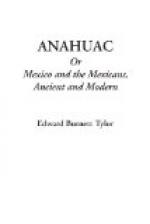On an average, the Presidency of the Republic of Mexico had changed hands once every eight months for the last ten years; and Don Ignacio Comonfort had stepped into the office in the previous December, on the nomination of his predecessor the mulatto general Alvarez, who had retired to the southern provinces with his army.
President Comonfort, with empty coffers, and scarcely any real political power, had felt it necessary to make some great effort to get popularity for himself and his government. He had therefore adopted the policy of attacking the fueros, the extraordinary privileges of the two classes of priests and soldiers, which had become part of the constitution under the first viceroys, and which not even the war of independence, and the adoption of republican forms, ever did away with. Neither class is amenable to the civil tribunals for debt or for any offences.[3] The clergy have immense revenues, and much spiritual influence among the lower classes; and as soon as they discovered the disposition of the new President, they took one Don Antonio Haro y Tamirez, set him up as a counter-President, and installed him at Puebla, the second city of the Republic, where priests swarm, and priestly influence is unbounded. At the same time, they tried a pronunciamiento in the capital; but the President got the better of them after a slight struggle, and marched all his regular soldiers on Puebla. At the moment of our arrival in the country, the siege of this city was going on quite briskly, ten thousand men being engaged, commanded by forty-three general officers.
Whenever anything disagreeable is happening in the country, Vera Cruz is sure to get its full share. A month before our arrival, one Salcedo, who was a prisoner in the castle of San Juan de Ulua, talked matters over with the garrison, and persuaded them to make a pronunciamento in favour of the insurgents. They then summoned the town to join their cause, which it declined doing for the present; and the castle opened fire upon it, knocking about some of the principal buildings, and doing a good deal of damage. A 30-pound shot went through the wall of our hotel, taking off the leg of an unfortunate waiter who was cleaning knives, and falling into the patio, or inner court. A daub of fresh plaster just outside our bedroom door indicated the spot; and the British Consul’s office had a similar decoration. The Governor of the city could offer no active resistance, but he cut off the supplies from the island, and in three or four days Salcedo—finding himself out of ammunition, and short of water—surrendered in a neat speech, and the revolution ended.
We have but a short time to stay in Vera Cruz, so had better make our observations quickly; for when we come back again there will be a sun nearly in the zenith, and yellow fever—at the present moment hardly showing itself—will have come for the summer; under those circumstances, the unseasoned foreigner had better lie on his back in a cool room, with a cigar in his mouth, and read novels, than go about hunting for useful information.




